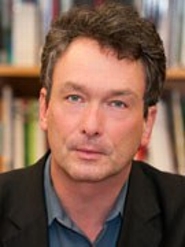
On Sept. 23, esteemed professor and author Michael Bérubé delivered a lecture to a crowded Kennedy Auditorium on the value of the humanities, addressing commonly held views about “universalism” and “the human.” Bérubé is the Edwin Erle Sparks Professor of Literature and director of the Institute for the Arts and Humanities at Pennsylvania State University and the author of seven books. His lecture was sponsored by the Dean of Faculty and the Hansmann Lecture Fund as part of the “Highlighting the Humanities at Hamilton” series.
Many insist that the humanities is a discipline in decline, as fields like science, math, technology and the social sciences gain in popularity. To the contrary, Bérubé pointed out that while the humanities suffered a sharp decline in student enrollments during the 1970s, its 8 percent share of enrollments has remained steady ever since. Nevertheless, as Bérubé insisted, it is important for the humanities to articulate and defend its value as an academic discipline. By presenting an overview of the last three decades of interpretive theory, Bérubé sought to illustrate that the value of the humanities indeed lies in its study of “universalism” and “the human.”
In his lecture, Bérubé challenged contemporary notions of universalism and ideas about how societies define “the human.” He argued that historically many groups of people have been excluded from universal conceptions what it means to be human, including gays and lesbians, people of certain nationalities, and additional groups defined as “other.” The recent rise of a new humanities discipline, disability studies, has once again challenged notions of universalism.
Bérubé traced how ideas about disability have developed in recent years and argued for a greater emphasis on disability studies in higher education. Reflecting on his experience as the father of a child with Down syndrome, he critiqued arguments that have historically justified the exclusion of intellectually disabled people based on notions of lesser cognitive abilities. Through personal anecdotes and theoretical discussion, Bérubé contested those discourses that situate people with intellectual disabilities outside the universal realm of “the human.”
Bérubé’s lecture concluded with a discussion of how to define the humanities and its worth. Ultimately Bérubé argued that the humanities is “a discipline of lifelong learning.” It is not a study of “fine objects and timeless truths,” but rather a study of “what is means to be human in a world where what it means to be human is not all that clear.”
Posted September 24, 2013
